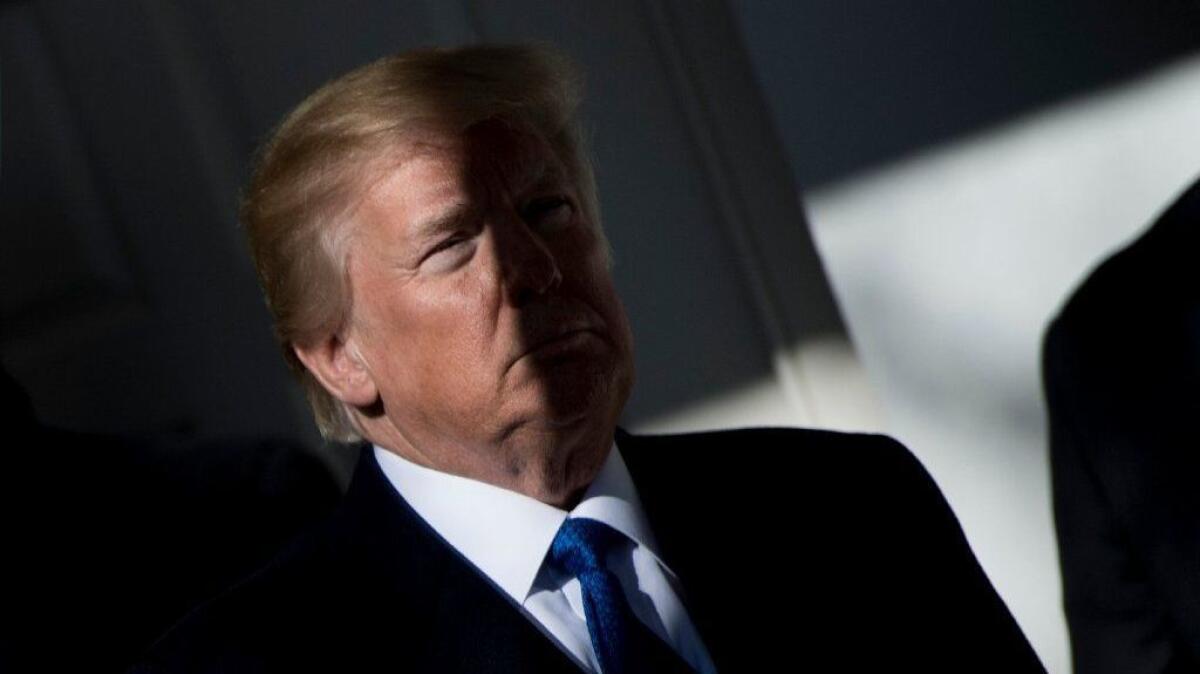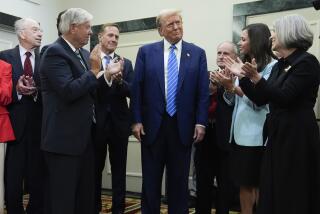Trump’s shifting stance on DACA deal vexed both parties as lawmakers sought to resolve shutdown crisis

Reporting from Washington — President Trump stood in the East Room of the White House last February and haltingly addressed what he called “a very, very difficult subject for me” — the hundreds of thousands of immigrants known as Dreamers, who came to this country illegally as children.
“We’re going to show great heart,” he vowed, gesturing with both hands during a news conference. “You have these incredible kids, in many cases — not in all cases. In some of the cases they’re having DACA and they’re gang members and they’re drug dealers too. But you have some absolutely incredible kids — I would say mostly — they were brought here in such a way — it’s a very, very tough subject.”
Nearly a year later, Trump is still finding it difficult to talk about how to handle about 700,000 immigrants who are set to lose protections from deportation. Last September he ordered an end to an Obama administration directive, the Deferred Action for Childhood Arrivals program, which allowed Dreamers to legally work, go to school or serve in the military after being vetted and paying a fee. But he also asked Congress to devise alternative protections by March.
His inconsistencies on what to do about the DACA beneficiaries since then have vexed both parties and helped fuel the first government shutdown in five years.
After the Senate agreed on Monday to reopen the government with a fourth stopgap spending measure — on the promise of a DACA vote soon — a broader immigration deal remains as elusive as ever, in large part because of Trump’s lack of clarity. Democrats and Republicans agree that his support is essential — that only he has the clout with the Republican base to allay nativist sentiment and push an immigration compromise to passage in the Republican-controlled Congress.
The White House has laid out conditions, including funding for a southern border wall as well as an end to immigration preferences for family members and a visa lottery program. Trump, however, has treated those as a starting point in negotiations, sending differing signals about how far he is willing to compromise.
At times, including during a televised meeting with lawmakers this month, the president has indicated to lawmakers that he would cut a quick deal to resolve the issue, only to yank the prospect away moments or days later.
After that conciliatory 55-minute televised session on a Tuesday, the following Thursday, Jan. 11, Trump agreed to two senators’ proposed bipartisan framework. Two hours later, he reneged at a larger meeting where Chief of Staff John F. Kelly had arranged to include five Republican lawmakers who opposed the plan.
In an interview on Fox News last week, Kelly claimed credit for reaching out to the opposing House and Senate members when he heard Trump, on a conference call, seem to endorse the plan outlined to him by Sens. Richard J. Durbin, a Democratic leader from Illinois, and Lindsey Graham, Republican of South Carolina.
“I don’t want the president to hear one side of a story,” said Kelly, himself something of a hard-liner on immigration.
In the same interview, as well as in a meeting with Latino lawmakers, Kelly spoke of helping Trump “evolve” from “uninformed” views about the border wall and other aspects of immigration, and suggested the president is flexible. That prompted a backlash from the proud president on Twitter the next morning, however, reinforcing his demands about the border wall.
By Kelly’s own recounting, Trump went from being “ecstatic” about the framework that Durbin and Graham had described to telling the senators, at the broader meeting Kelly engineered, that it was “not what I have in mind.”
It was at that heated session with seven lawmakers that Trump complained about the United States having to accept immigrants from Haiti and “shithole” African countries — a slur that, once reported, further poisoned the well for a bipartisan outcome.
The Dreamers have support from nearly nine in 10 Americans, polls show. Trump has said they should rest easy, a resolution is coming. Yet the minority of Americans who oppose granting them legal status are among his core supporters
The president’s vacillation seems to extend to his administration. Last week, the Justice Department appealed to the Supreme Court a lower court decision that required the DACA program to stay in place for those seeking to renew their two-year permits. But it did not ask that the lower-court order be put on hold while the case proceeds. Instead, the administration asked for a ruling by June; there is no guarantee the court will act by then.
While the White House insisted the president has been consistent, even leaders of his own party have said otherwise.
So vexed was Senate Majority Leader Mitch McConnell (R-Ky.) as a shutdown loomed that he telegraphed his frustration from the Senate floor on Thursday: “I’m looking for something that President Trump supports, and he has not yet indicated what measure he is willing to sign.”
Senate Minority Leader Charles E. Schumer (D-N.Y.) made the same complaint from the Senate floor on Monday, saying that Republican leaders in Congress “could never get a firm grip on what the president of their party wanted to do.”
Schumer, amid his retreat on the standoff, took a jab at Trump: During the shutdown, he said, “The great deal-making president sat on the sidelines.”
To reopen the government, Schumer dealt with McConnell, and both of them with a bipartisan group of senators. The White House stayed eerily quiet over the weekend, with no public appearances from Trump and fewer provocative tweets than typical.
A sidelined Trump was just what Republicans leaders seemed to want in the final maneuvering. By Sunday night, one of the Republicans in the bipartisan group of senators working to end the shutdown, Sen. Jeff Flake of Arizona, a Trump critic, said that Trump would have only gotten in the way.
“I don’t think it helps for him to be involved right now,” he said. On Monday, Flake said that the mixed messages from the White House had been the group’s biggest hurdle.
The outcome was a temporary victory for Republicans, but not a personal one for Trump. The president who once boasted that “I alone can fix” Washington dysfunction, and chastised President Obama during the 2013 shutdown for “not leading and not getting people into a room,” was mostly missing in action.
White House Press Secretary Sarah Huckabee Sanders nonetheless argued that “what the president did clearly worked” to end the shutdown.
In any case, Republicans say they will need Trump to get a deal through the House.
“Somebody’s got to lead,” Graham said on Sunday. “The White House staff has been pretty unreliable.”
Trump’s hesitancy and loose grasp on policy details could continue to hamper his ability to broker a deal. During the televised meeting this month, Trump seemed to suggest he would accept a “clean” bill to legalize Dreamers, only to retreat quickly after House Majority Leader Kevin McCarthy (R-Bakersfield) interrupted to remind the president of the immigration restrictions he’d demanded in exchange.
“Someone who is not immersed in politics doesn’t think of legislation in terms of clean or dirty,” said Rosemary Jenks, who heads government relations for Numbers USA, a group pushing Trump to hold a hard line for immigration restrictions. “I think that’s just a difference between Washington-speak and English.”
Staff writer Lisa Mascaro contributed to this report.
Twitter: @noahbierman
More to Read
Get the L.A. Times Politics newsletter
Deeply reported insights into legislation, politics and policy from Sacramento, Washington and beyond. In your inbox three times per week.
You may occasionally receive promotional content from the Los Angeles Times.











